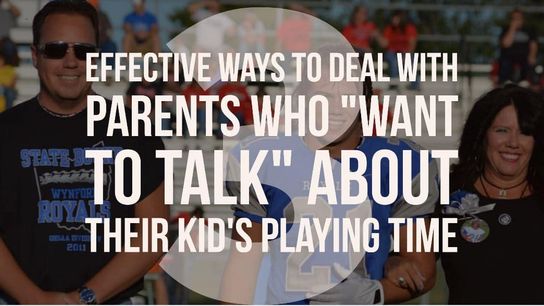It happens to every head coach, often multiple times in a season. For head coaches it starts with a call, email, or text from a parent "wanting to talk" about their child's playing time.
It's not a situation that coaches look forward to dealing with, and most guys have a plan of action on a situation like this before they even interview, but many assistants looking to become head coaches one day are still formulating their plan of attack, and it's best to have that ironed out before you sit in from of an interview committee. Because during that interview process, you'll almost surely field the question sooner or later, and even if you don't, you need to have a plan ready.
The sooner, and clearer that plan is communicated with parents, players, and the community, the better.
Here are three effective ways to address with the sensitive topic of playing time with parents.
- Make it clear that it is not a topic up for discussion right off the bat
Many coaches have an open door policy where parents can come and talk to them about literally anything concerning their kids or the program, but many coaches find it effective to draw the line at the topic of playing time. It's just not something they're willing to discuss. I remember reading somewhere that Bob Ladocuer, the head coach at powerhouse De la Salle HS (CA) who led the program to 151 wins, adopted this approach and used it with a great deal of success. - Set up a meeting with you, the parent / parents, and the kid's position coach
To avoid any miscommunication or misinterpretations, it's always a good idea to have a third party in the meeting with you, and who better than the kid's position coach who sees the student athlete in question and the other guys on the depth every single day. While the head coach and parent should surely drive the conversation, it's always helpful to have another knowledgeable person there there familiar with the situation. I've heard from coaches that use this approach but have one small caveat - under no circumstance do they discuss another player, EVER. The meeting is solely about the parent and their child only. - Offer to have the discussion, BUT only with the entire team AND their parents in attendance
This is a rather interesting approach that I first heard from Lowell HS (MI) head coach Noel Dean, who has built one of the most successful programs in Michigan, where he has amassed over 200 wins. Coach Dean will agree to meet and discuss playing time, but only under the condition that all other players and their parents are in attendance as well. Think about that for a second. What kind of parent is going to agree to that, and then get up in front of players and parents and talk about how their kid is better than another kid with that player and their parents present? Dean shares that, with this approach, he's never had to address playing time in that manner.
With these guidelines laid out, it's also important to set out some ground rules on WHEN and HOW this topic is willing to be concussed. There is a time and place for every conversation and for most coaches, coming off the field after a game isn't the time or place for it. Again, that needs to be communicated with coaches and players clearly, early on after your hire, and as often as necessary to get the point driven home.
Some coaches prefer to do it after practice in their office or classroom, while others will cue up some practice film and talk about what needs to be improved. There isn't a one-size-fits-all approach, you've got to find what works for you, and your community.
Is there an approach you use, or have heard or seen used that isn't included but is worth sharing? Let me know at doug@footballscoop.com or via Twitter @CoachSamz.
